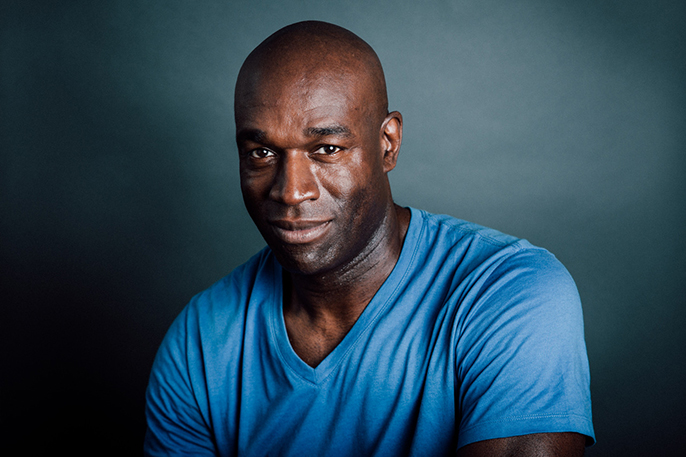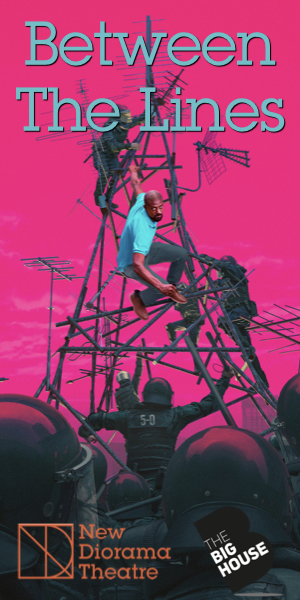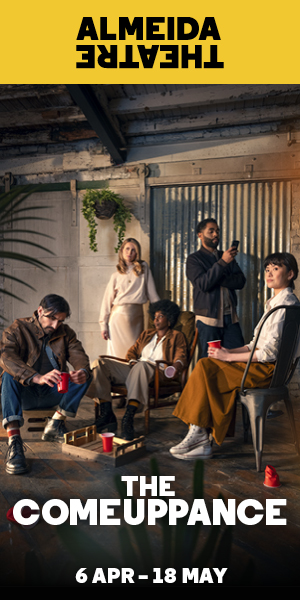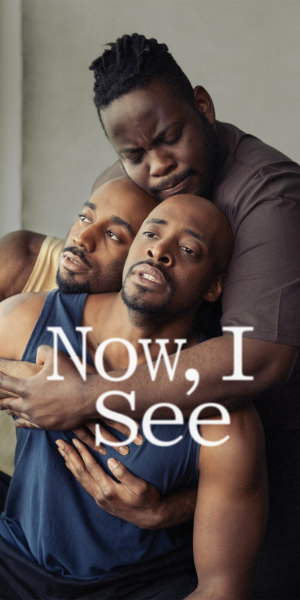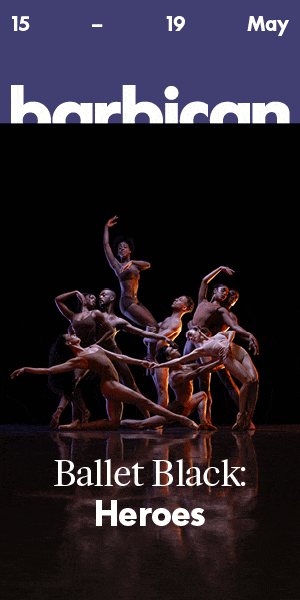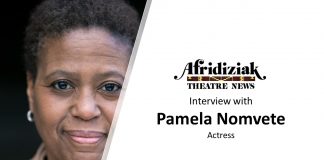Steve Toussaint – interview
Father Comes Home From the Wars, Royal Court Theatre
Steve Toussaint is one of our most successful British actors. A familiar face on our TV screens, the South East Londoner has starred in hit series such as Doctors and The Bill and acted in major films such as Judge Dredd and Prince of Persia. Toussaint’s stage career has also seen the actor tread the boards in prestigious theatres from the National to the Yorkshire Playhouse.
It therefore comes as something of a revelation that Toussaint’s illustrious acting career almost didn’t happen. Far from the dramatic sphere, Toussaint studied for a politics degree, taking part in a couple of student productions in his spare time. It wasn’t until his early twenties during a stint working in a bank that he decided to pursue a more creative path.
“I thought ‘I’ll give it a try and if it doesn’t work out at least it can say I tried.’ Someone once told me that 95%of people in the world are doing something that they’re second best at because they didn’t have the opportunity or the courage to pursue what they really want to do. I didn’t want to be on my deathbed and going ‘Oh, I didn’t do that thing.’ So I went to evening classes and auditioned and got in that way. I’ve been very lucky. I always say I got in through the back door.” (Laughs.)
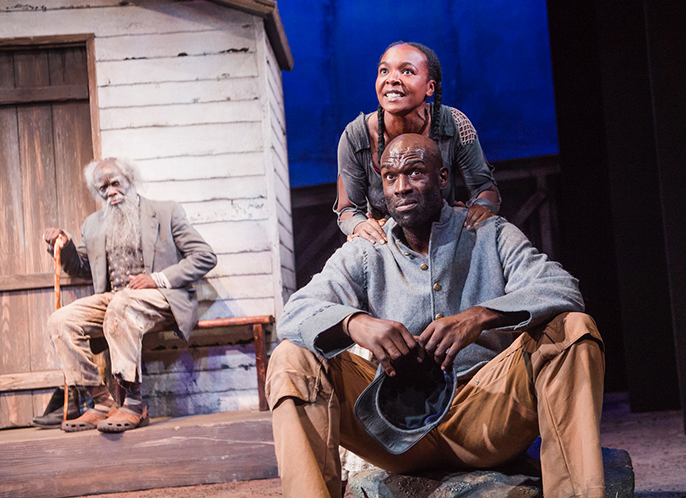
Father Comes Home From the Wars is epic, it’s ambitious, the writing is fantastic and the performances are great. Like all good dramas it says something about us, about today
Much to the delight of British audiences, Toussaint made the challenging choice to change his own destiny. Currently starring in Father Come Home from the Wars (see listing), Toussaint’s character Hero battles with a life changing decision. In Suzan Lori-Parks three part drama, set in the American civil war, Hero faces a gruelling moral dilemma.
Toussaint explains: “Hero is a slave who is asked by his master to join the American civil war, to fight on the side of the confederates and for that he’ll be given his freedom. The first part of the play is Hero’s dilemma; whether he should go or not. Obviously fighting for the confederates means he’s fighting against the cause of emancipation. But he’s been offered his own freedom. I think Suzanne (Lori-Parks – Writer) put it best, ‘If you were offered the thing you wanted most in life but you had to do the thing you least wanted to do in life.’”
Whilst the play is set during the bloody States war, Toussaint points out that elements of the period strongly resonate in current society: “What Suzan has achieved is to make it ostensibly about that period, but it’s a lot about today. She’s put it in anachronistic terms, but we still have the parallels with what’s happening today. Particularly for example with the Black Lives Matter movement… Especially in current society, I think we need to speak to that today”
Toussaint self-effacingly shares that he was not as well informed about the American Civil War as he’d have liked. In preparation for his role, the actor read two chronicles by American historian Howard Zinn, which he says were invaluable: “Zinn’s point is that history is written by the winners, for example when I was at school, Africa had little place in the books that we read because it was the conquerors that wrote these books. So in Zinn’s A People’s History of the United States, he researched letters and testimonies from people of the period. Some were from slaves and ex-slaves, soldiers, and there were notes passed from person to person planning insurgences. So these things I found interesting more than a standard history book, because the play is about human behaviour. I don’t know that human behaviour has changed that much in the last 150 years.”
Born in Birmingham to Bajan parents, Toussaint moved to London at the age of three. Growing up on a south east London estate, Toussaint shares that he didn’t know anybody in the profession. But seeing Gary Oldman, who grew up in his area on screen proved motivational. “I thought ‘Oh wow, someone from where we’re from can do something like that.’” Toussaint comes across as very genuine during the interview, attentively considering my questions with an affirmative “mm, mm.” When asked about the trajectory of his character and whether he suffers from Post-Traumatic Stress Disorder, he insightfully responds: “During this trilogy, we follow Hero over roughly two and a half years. When he returns from the war, emancipation has been proclaimed, but he is a changed man. I think there’s aspects of PTSD, but it’s open to interpretation. After the war, Hero is so different, he’s even changed his name. But he’s trying so hard to be the same. I believe the American civil war was one of the most bloody, in terms of the things that he’s seen, he will have been affected.”
This trilogy is the first instalment of nine plays following this story. Toussaint shares that Lori-Parks has let slip plans to follow the tale as far as the 1960s, but is playing her cards close to her chest. Having toured throughout America to great reviews, I ask Toussaint whether he believes a British audience will receive the play differently to those across the pond.
“Actually, last night was press night and my very very good friend Jenny Jules was there and she had starred in the very first production in New York. So speaking to her, and the director (Jo Bonney) and Suzan, I think there are going to be a few things that will be more poignant to an American audience. For example in part two there’s a scene where I talk about being stopped by a controller as an ex-slave and I hold my hands up. That’s very poignant because it’s so linked to the Black Lives Matter and ‘Stop don’t shoot!’ But so far here, the audience has responded empathetically I think. I have noticed the difference when we have an audience, which is more composed of people of colour, they seem to get more of those signposts. I could be doing the rest of the audience a disservice, but that how it feels on the stage when you have your own there. There’s a shorthand.”
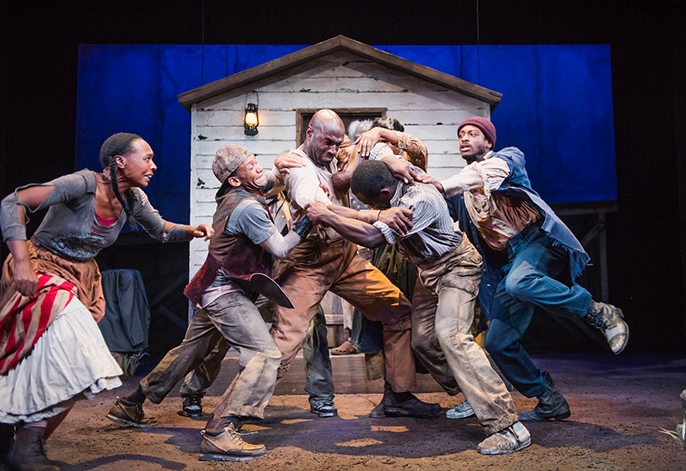
This is not the first time Toussaint has acted in a historical war drama. Most notably he starred in 2005 film Shooting Dogs, set during the four year Rwandan Genocide. The actor shares that he was proud to be a part of the movie and found filming on location a profound experience.
“I recalled that during the war, I’d open the Sunday papers and to my shame would go ‘Oh, I just can’t look at this’ and turn the page. Then when I was there ten years later, I was incredibly embarrassed and ashamed because I met people who’d lived through it. You met these incredible people who’d had these horrific life stories and were still striving and living and optimistic, so you felt a huge responsibility. It was a harrowing film, but it’s one of those rare things in your career where you go back and think ‘Yeah that was good.’ I was very proud to be a part of it in my own little way.”
Hero is a slave who is asked by his master to join the American civil war, to fight on the side of the confederates and for that he’ll be given his freedom
Humble to a fault, Toussaint says he feels lucky to be in the career that he is. This has not affected the Lewis star’s discernment when it comes to roles. Toussaint puts this down partly to his political awareness and also to his father’s influence.
“I remember being about eight or nine and we were watching a film with Sidney Poitier. My dad said ‘The thing about that actor there, he has never taken a role where the black man is denigrated.’ That’s always stuck with me. I would never do a role that I didn’t approve of. That doesn’t mean I would play a villain, but we have to be aware especially as people of colour in this country. We have to be aware of the ramifications of how we conduct ourselves and the roles that we play.”
Having obviously put a great deal of thought into his current role, it is invigorating to speak to an actor with such conviction in their work. Before we finish the interview, I ask Toussaint why people should come and see Father Comes Home from the Wars. His intelligent answer rather charmingly entails a direct invitation to audiences everywhere: “Because it’s epic, it’s ambitious, the writing is fantastic and the performances are great. Like all good dramas it says something about us, about today. George Santayana said ‘Those who do not learn history’s mistakes are doomed to repeat them.’ This play is trying to say look at how we were and how can this help us relate to each other today. It’s a great evening so please do come.”
Info: Father Comes Home From the Wars is at the Royal Court Theatre until 22 October 2016 | Book tickets | Watch trailer
























